So This is New York (1948): “Shucks and Friday!”
Playwright George S. Kaufman once observed: “Satire is what closes on Saturday night.” Perhaps this famous quote might be able to explain the dismal box-office take of So This is New York (1948), a motion picture that failed to win over audiences despite laudatory reviews. The satirical comedy, based on Ring Lardner’s novel The Big Town, certainly possessed a pedigree from one of filmdom’s finest stables: it was co-written by Carl Foreman (who would later go to write the screenplays for film classics like Champion, The Men and High Noon) and directed by Richard Fleischer (20,000 Leagues Under the Sea, Fantastic Voyage). It was produced by Stanley Kramer, who would become one of the most prominent filmmakers of the 1950s and 1960s with “social dramas” like The Defiant Ones and Judgment at Nuremberg.
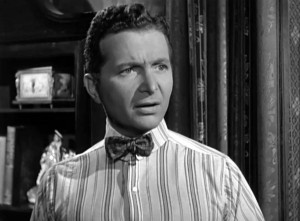 It was also the only starring role in feature films for “radio’s bad boy,” legendary humorist Henry Morgan. Morgan, an acerbic comedian who at the time of the film’s shooting was headlining a weekly half-hour comedy series on ABC Radio, was perfect casting for the movie’s lead character—Ernie Finch, a cigar salesman from South Bend, Indiana. (The opening credits of New York even feature Morgan “outside the same cigar store” as a nod to his weekly sign-off.) Married to a woman who’s jointly inherited a large sum of money ($60,000) along with her flighty sister, Ernie finds himself roped into taking a trip to “the big town,” New York City, because wife Ella (Virginia Grey) hopes to find a better class of husband for her sister Kate (Dona Drake) instead of Kate’s fiancé, butcher Willis Gilbey (Dave Willock). Ernie knows nothing good will come of this. “All you’re going to get for it in New York is grief…only you’ll pay more for it.”
It was also the only starring role in feature films for “radio’s bad boy,” legendary humorist Henry Morgan. Morgan, an acerbic comedian who at the time of the film’s shooting was headlining a weekly half-hour comedy series on ABC Radio, was perfect casting for the movie’s lead character—Ernie Finch, a cigar salesman from South Bend, Indiana. (The opening credits of New York even feature Morgan “outside the same cigar store” as a nod to his weekly sign-off.) Married to a woman who’s jointly inherited a large sum of money ($60,000) along with her flighty sister, Ernie finds himself roped into taking a trip to “the big town,” New York City, because wife Ella (Virginia Grey) hopes to find a better class of husband for her sister Kate (Dona Drake) instead of Kate’s fiancé, butcher Willis Gilbey (Dave Willock). Ernie knows nothing good will come of this. “All you’re going to get for it in New York is grief…only you’ll pay more for it.”
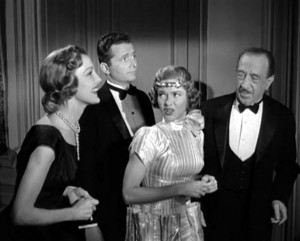 On the slow train trip to the Big Apple, Ernie and the sisters make the acquaintance of wealthy stockbroker Francis Griffin (Jerome Cowan), who would seem to be the perfect mate for Kate…but he later shows his true colors when he reveals he has designs on married Ella. The next eligible bachelor to make the family’s acquaintance is Lucius Trumbull (Hugh Herbert), an eccentric—but still wealthy—collector of antiquities. Trumbull has two strikes against him: he’s considerably older than Kate (Ernie notes that both of them got new teeth fifteen years ago…only Trumbull paid for his)…and he’s already married. Then it’s on to another rich man—courtly Southern gentleman Herbert Daley (Rudy Vallee), whose passion for the horses will prove to be his undoing…because Kate falls for the jockey who commandeers Daley’s racehorse, Sid Mercer (Leo Gorcey).
On the slow train trip to the Big Apple, Ernie and the sisters make the acquaintance of wealthy stockbroker Francis Griffin (Jerome Cowan), who would seem to be the perfect mate for Kate…but he later shows his true colors when he reveals he has designs on married Ella. The next eligible bachelor to make the family’s acquaintance is Lucius Trumbull (Hugh Herbert), an eccentric—but still wealthy—collector of antiquities. Trumbull has two strikes against him: he’s considerably older than Kate (Ernie notes that both of them got new teeth fifteen years ago…only Trumbull paid for his)…and he’s already married. Then it’s on to another rich man—courtly Southern gentleman Herbert Daley (Rudy Vallee), whose passion for the horses will prove to be his undoing…because Kate falls for the jockey who commandeers Daley’s racehorse, Sid Mercer (Leo Gorcey).
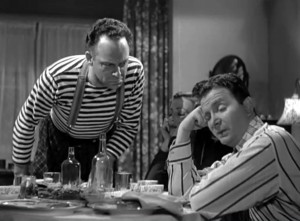 Finally, Ella and Kate make the acquaintance of stage comedian Jimmy Ralston (Bill Goodwin), who while not bragging about the money he’s making as the headliner for the Ziegfeld Follies, has serious dramatic aspirations and convinces both women to be “angels” for a play in which he’s modestly directing, writing, producing and starring. The production is a flop, and because Ella has blown all of the family’s money (including a secret stash won by Ernie playing the ponies) it looks as if they’ll be trapped in New Yorkfor the rest of their lives. Fortunately, they are rescued by a deux ex machina ending and return to South Bend sadder but wiser.
Finally, Ella and Kate make the acquaintance of stage comedian Jimmy Ralston (Bill Goodwin), who while not bragging about the money he’s making as the headliner for the Ziegfeld Follies, has serious dramatic aspirations and convinces both women to be “angels” for a play in which he’s modestly directing, writing, producing and starring. The production is a flop, and because Ella has blown all of the family’s money (including a secret stash won by Ernie playing the ponies) it looks as if they’ll be trapped in New Yorkfor the rest of their lives. Fortunately, they are rescued by a deux ex machina ending and return to South Bend sadder but wiser.
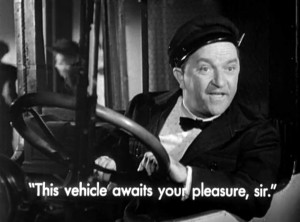 Lardner’s satirical novel was re-tailored extensively for Morgan’s comedic gifts (he’s even billed in parentheses during the closing credits as “ABC’s comedy star”)…but if you were unaware of this on a first viewing of So This is New York, you’ll definitely detect Henry’s stamp all over the picture. This is most evident in the sequence where Ernie and Ella attend the opening night of Ralston’s play, Bridget Sees a Ghost (in which Kate plays the small part of “Bridget”); an awful experience to be sure, but one that results in much hilarity due to Morgan’s wisecracking narration…which could have come directly from one of his radio scripts. (I’m pretty sure Henry also contributed the gag in which the gamblers to whom Vallee’s Daley is in debt are introduced as “Hooper, Crossley and Hemingway.”) There’s a subtlety to much of the film’s humor; it features one of the earliest uses of the translation gag—where a character’s vernacular has to be translated via subtitles, a la the “jive” scene in Airplane! (in New York, it’s a cab driver played by Phil Arnold, whose query of “Hey, Mack…I can’t wait all day for you to choose up sides—you want a hack, or don’t you, hey?” is translated as “This vehicle awaits your pleasure, sir”). (I also broke up when Morgan’s character, who constantly has to tip the men delivering packages of clothing purchases to the hotel room, has streamlined the process by wearing a conductor’s change maker on his belt.)
Lardner’s satirical novel was re-tailored extensively for Morgan’s comedic gifts (he’s even billed in parentheses during the closing credits as “ABC’s comedy star”)…but if you were unaware of this on a first viewing of So This is New York, you’ll definitely detect Henry’s stamp all over the picture. This is most evident in the sequence where Ernie and Ella attend the opening night of Ralston’s play, Bridget Sees a Ghost (in which Kate plays the small part of “Bridget”); an awful experience to be sure, but one that results in much hilarity due to Morgan’s wisecracking narration…which could have come directly from one of his radio scripts. (I’m pretty sure Henry also contributed the gag in which the gamblers to whom Vallee’s Daley is in debt are introduced as “Hooper, Crossley and Hemingway.”) There’s a subtlety to much of the film’s humor; it features one of the earliest uses of the translation gag—where a character’s vernacular has to be translated via subtitles, a la the “jive” scene in Airplane! (in New York, it’s a cab driver played by Phil Arnold, whose query of “Hey, Mack…I can’t wait all day for you to choose up sides—you want a hack, or don’t you, hey?” is translated as “This vehicle awaits your pleasure, sir”). (I also broke up when Morgan’s character, who constantly has to tip the men delivering packages of clothing purchases to the hotel room, has streamlined the process by wearing a conductor’s change maker on his belt.)
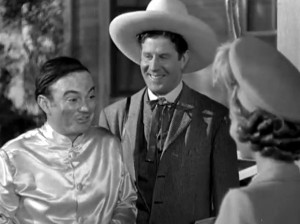 The supporting cast of So This is New York provides the film with its major strengths, and it’s wonderful to see so many radio second bananas land plum roles. You have Bob Hope/Burns & Allen announcer Bill Goodwin as hammy comedian Jimmy Ralston, and Jack Carson’s longtime vaudeville partner and sitcom “Tugwell,” Dave Willock, as Kate’s South Bend butcher beau. Leo Gorcey, best known to movie buffs as the Bowery Boys’ Terence Aloysius “Slip” Mahoney, is also on hand—Gorcey was a regular on Groucho Marx’s short-lived Blue Ribbon Town and Bob Burns’s radio show as well. Perhaps the most famous of the supporting players is the Vagabond Lover himself, Rudy Vallee—whose glorious radio days of the 1930s were somewhat behind him but who was reemerging in films as a most unlikely comedian thanks to appearances in such Preston Sturges films as The Palm Beach Story and Unfaithfully Yours.
The supporting cast of So This is New York provides the film with its major strengths, and it’s wonderful to see so many radio second bananas land plum roles. You have Bob Hope/Burns & Allen announcer Bill Goodwin as hammy comedian Jimmy Ralston, and Jack Carson’s longtime vaudeville partner and sitcom “Tugwell,” Dave Willock, as Kate’s South Bend butcher beau. Leo Gorcey, best known to movie buffs as the Bowery Boys’ Terence Aloysius “Slip” Mahoney, is also on hand—Gorcey was a regular on Groucho Marx’s short-lived Blue Ribbon Town and Bob Burns’s radio show as well. Perhaps the most famous of the supporting players is the Vagabond Lover himself, Rudy Vallee—whose glorious radio days of the 1930s were somewhat behind him but who was reemerging in films as a most unlikely comedian thanks to appearances in such Preston Sturges films as The Palm Beach Story and Unfaithfully Yours.
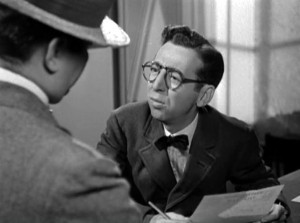 One other second banana whom Morgan insisted on featuring in New York was his radio sidekick Arnold Stang, who has a memorable bit role as a Western Union clerk arguing with Morgan’s Finch about the length of a telegram he wants to send (the message consists of only one word: “Now”). “What is it, in code?” Stang’s clerk asks at one point, whereupon Finch insists “My friend will understand it.”
One other second banana whom Morgan insisted on featuring in New York was his radio sidekick Arnold Stang, who has a memorable bit role as a Western Union clerk arguing with Morgan’s Finch about the length of a telegram he wants to send (the message consists of only one word: “Now”). “What is it, in code?” Stang’s clerk asks at one point, whereupon Finch insists “My friend will understand it.”
“I don’t understand it,” snaps the clerk during the amusing exchange. Morgan’s Finch then ends the argument by telling the clerk: “Look, Senator. I’m payin’ for ten words. You send it just the way it is there, and put the other nine words on somebody else’s telegram.” But Arnold gets the last word when he mutters “Wise guy” after Finch exits the office.
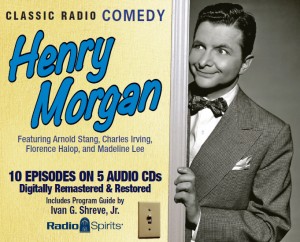 Even the film’s low-budget (director Fleischer shot the movie the same way he would do some of his later film noirs like Follow Me Quietly and Armored Car Robbery) wasn’t able to allow So This is New York to turn a profit, so this and a small role in the 1960 film Murder, Inc. were the only cinematic contributions to be made by Henry Morgan, who is probably best known by today’s generation as a wry panelist on TV’s I’ve Got a Secret. Though Morgan’s reign in radio was relatively brief, his surviving broadcasts reveal a comedian who possessed a ready and rapier-like wit in the same league as his good friend Fred Allen. Radio Spirits invites you to check out this brand new CD collection containing ten broadcasts from the comedian’s heyday in 1946 and 1947.
Even the film’s low-budget (director Fleischer shot the movie the same way he would do some of his later film noirs like Follow Me Quietly and Armored Car Robbery) wasn’t able to allow So This is New York to turn a profit, so this and a small role in the 1960 film Murder, Inc. were the only cinematic contributions to be made by Henry Morgan, who is probably best known by today’s generation as a wry panelist on TV’s I’ve Got a Secret. Though Morgan’s reign in radio was relatively brief, his surviving broadcasts reveal a comedian who possessed a ready and rapier-like wit in the same league as his good friend Fred Allen. Radio Spirits invites you to check out this brand new CD collection containing ten broadcasts from the comedian’s heyday in 1946 and 1947.

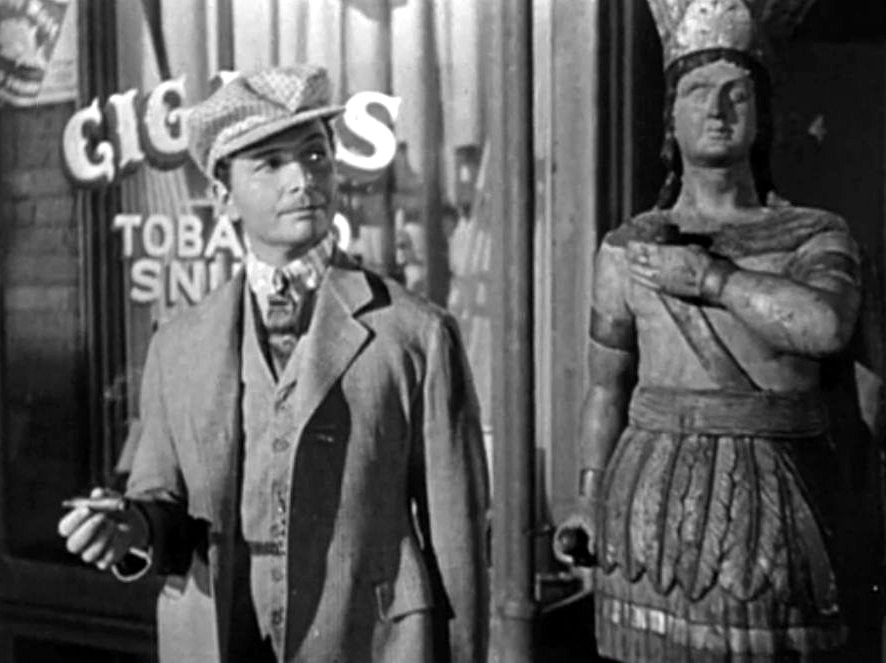

I’m dying to see this movie. Good to know that as recently as 2014, this was released to DVD. I bought the Radio Spirits latest Henry Morgan show… I only hope RS, releases more of the Henry Morgan Show, that isn’t already out there?
I heartily recommend a purchase, Rob — it’s available on Blu-ray, too!